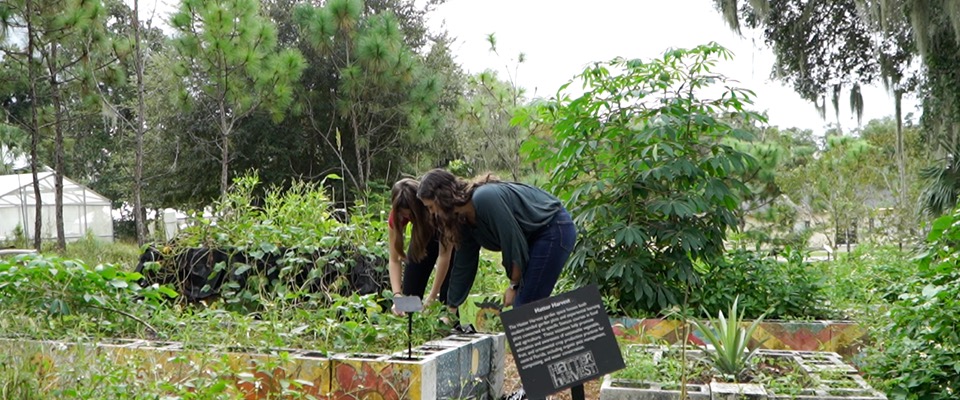
Sustainable Food Systems
Sustainable Food Systems (m) The Sustainable Food Systems program offers an interdisciplinary minor where you will explore diverse academic and practical perspectives on food and agriculture. You'll tackle challenges to create food security and foster a sustainable, equitable and healthy food future for everyone. Our program collaborates with partners across campus and the region. In our classes, you'll delve into topics such as agricultural production, food and the environment, nutrition and public health, food communication and media, food policy and food history. You'll develop critical analysis skills that empower you to examine complex food systems from multiple viewpoints, crucial for understanding our interconnected food networks.
Why Sustainable Food Systems at Stetson University?
Our curriculum encourages you to critically examine your own participation in food systems and empowers you to become an activist for positive food system change. Hands-on, experiential learning is at the heart of our Sustainable Food Systems program. You can join Hatter Harvest, our on-campus garden project, or explore sustainability initiatives in Campus Dining Services. In the FOOD 102 practicum course, you will spend a semester with a community partner, actively working to improve food systems.
Related Programs:
Interested in this program?
Take the next step and let us know that you were here.

"You get to make a decision about what kind of world you want to live in through the food that you grow and the food that you buy, so I feel like that is a place where people actually can make a change."
Sarah Cramer, PhD, Assistant Professor of Sustainable Food Systems

"...it's also personal. I was allergic to gluten and diary growing up and...having a curriculum that goes into that and talks about that is really interesting to me,"
Riley McGovern '19 Environmental Studies and Sustainable Food Systems
Career Outcomes
Stetson's interdisciplinary Sustainable Food Systems program equips you with a comprehensive understanding of food and society, drawing from diverse fields such as environmental sciences, communication, nutrition, English, public health and chemistry. This program prepares you to pursue a variety of careers including sustainability, community food security, public health, environmental studies, food operations and more, ranging from extension education to farm-to-table sustainability consulting.
According to the U.S. Bureau of Labor Statistics, employment for agricultural and food scientists is expected to grow by 9% through 2030, matching the average growth rate for all occupations, with a median annual wage of $74,160 as of May 2021. While employment for farmers, ranchers and other agricultural managers is projected to remain stable through 2030, about 84,800 openings are anticipated annually over the decade, primarily due to workforce turnover. This context highlights substantial opportunities for you in both emerging and established areas of the food sector.




As you begin your journey, you will work with some of our distinguished faculty and dedicated professionals who will provide you with personal attention and expert guidance to help you thrive academically and professionally.
- Wendy Anderson, PhD, Vanderbilt University
- Nancy Barber, MFA, University of Florida
- Sarah Cramer, PhD, University of Missouri
- Jason Evans, PhD, University of Florida
- Asal Johnson, PhD, Florida State University
- Ronette Lategan-Potgieter, PhD, University of the Free State-South Africa
- Tara J. Schuwerk, PhD, Arizona State University, Director of Sustainable Food Systems
- Ben Tanner, PhD, University of Tennessee
In Stetson's Sustainable Food Systems program, you'll explore a diverse curriculum with courses such as Food Studies, Growing Food in Cities and Special Topics in Sustainable Food Systems, supplemented by opportunities for Teaching Apprenticeships. The Seeds of Equity course, reflecting Stetson’s commitment to social justice, addresses historical and current issues of race, class and gender in food and agriculture, exploring concepts like access, power and equity. This will encourage you to critically reflect on your role and responsibilities within the agriculture-food system.
Your education will be enhanced by practical, hands-on learning. In the Beginning Practicum for Sustainable Food Production, you’ll gain real-world farming experience, from soil management to food processing. Additionally, participating in the Hatter Harvest club offers you practical gardening skills and collaboration with the Gillespie Museum to support biodiversity. These experiences, including sustainability studies with Campus Dining Services, provide a holistic understanding of sustainable food production and systems management.
Visit Stetson
See for yourself why Stetson continues to be a top spot for learning and exploring.
VisitFinancial Aid
Learn more about the tools you can tap into to make your college experience affordable.
Explore